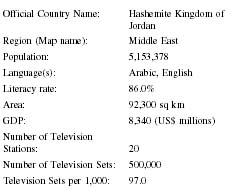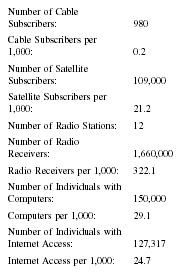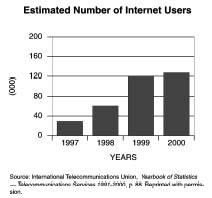Jordan
Basic Data

| Official Country Name: | Hashemite Kingdom of Jordan |
| Region (Map name): | Middle East |
| Population: | 5,153,378 |
| Language(s): | Arabic, English |
| Literacy rate: | 86.0% |
| Area: | 92,300 sq km |
| GDP: | 8,340 (US$ millions) |
| Number of Television Stations: | 20 |
| Number of Television Sets: | 500,000 |
| Television Sets per 1,000: | 97.0 |

| Number of Cable Subscribers: | 980 |
| Cable Subscribers per 1,000: | 0.2 |
| Number of Satellite Subscribers: | 109,000 |
| Satellite Subscribers per 1,000: | 21.2 |
| Number of Radio Stations: | 12 |
| Number of Radio Receivers: | 1,660,000 |
| Radio Receivers per 1,000: | 322.1 |
| Number of Individuals with Computers: | 150,000 |
| Computers per 1,000: | 29.1 |
| Number of Individuals with Internet Access: | 127,317 |
| Internet Access per 1,000: | 24.7 |
The desert kingdom of the Hashemite dynasty/family, Jordan lies east of Israel and south of Syria. A product of the collapse of the Ottoman Empire, Jordan has been a victim of the creation of Israel. One of the main trade routes once flowed through Haifa, which is currently an Israeli port, forcing Jordan to look elsewhere, primarily to Lebanon's destabilized harbors. Otherwise Jordan must use more difficult trade route strategies. In 1946, Jordan's population at independence was approximately 400,000. That figure included nomads, peasants, villagers and a modest number of urban dwellers (De Blij 310). However, the configuration of Israel and partition of Palestine have impacted the country greatly, pumping up the numbers of refugees, incorporating peoples who lived along geographic lines of demarcation and finding themselves faced with the idea of beginning a national independent life as a poor country. Jordan in 2002 was still a poor country with little to sustain an impoverished population. Regional war and political and religious conflicts have left Jordan with persistent problems facing a hard-pressed monarchy that is unpopular with a large portion of the citizens. Many people in Jordan do not even consider themselves citizens of the country and support for the government is minimal at best.
Geographic location plunges Jordan into a larger than expected role in regional Middle Eastern politics and economics. During his 46-year reign, King Hussein of Jordan created an image of peacemaker in the region. The press in Jordan and internationally looked favorably on Hussein, especially since he had a beautiful American-born queen as his last wife. Americans were fascinated by the positive image generated by the semi-free press in Jordan and in Europe, often showing images of the queen. What was not so readily observed was the poverty of the country and the various groups whose dissent threatened to bring Jordan into conflict with Israel—the war in 1967 had been so disastrous for the country that another could not be entered into lightly. War had to be avoided, but geographic location left Jordan vulnerable on all sides to political unrest and regional difficulties of the Middle East. American, British and some French aid kept Jordan afloat, and kept the semi-free press supportive of America and its allies. The death of King Hussein in 1999 abruptly ended the positive image of leadership and "peaceful" efforts in a politically unstable region, leaving his son, King Abdullah II, the difficult task of having to stabilize a country and a monarchy vulnerable to the dangers of the region and the poverty and dissatisfaction of its own inhabitants. King Abdullah II traveled in 2002 to England and to the USA in an effort to prevent an attack on Iraq and in order to seek the creation of a Palestinian State. Combined with the lack of oil, poor soil and agricultural production (though they still produce melons, tomatoes, sheep, and goats), regional dangers and a controversial queen—Abdullah's wife Rania is a Palestinian and proud of it, to the point of walking in peaceful marches in support of a Palestinian State, and the youngest reigning consort in the world—Jordan's press could be expected to be more critical were the King's government not capable of interference in the press and media.
There are mixed signals on the "freedom of the press" ideals in Jordan. King Abdullah II says that he advocates a transparency in the press, indicating that there is nothing to hide and that Jordan has nothing to fear. However, there is only one press association in Jordan and all journalists are expected to belong to the Jordan Press Association. Jordan recently punished a journalist who was critical of government corruption in an article published on a US website. Reporters Without Borders has protested the imprisonment of Toujan Faisal, 53, who was accused of slandering state institutions in Arab Times , published out of Houston, Texas. Faisal was the first Jordanian female legislator. She was recently released on "humanitarian grounds" by the King, due to her failing health. Human rights activists and watch groups target Jordan's King Abdullah for using tribal chiefs and tribal based law codes and secret police to catch "offenders" who use the press to expose violations.
One very controversial topic in the country of Jordan concerns the killing of women by male family members who deem that the woman has somehow brought shame to the family name. The laws in Jordan favor the males and women have been secretly smuggled into the USA

The King and his government use the Internet extensively to combat "bad press" and promote a positive image on the Hashemite dynasty. New websites about King Abdullah and his family promote a positive image of the king while providing access to information about the family dynasty, the country and the government. Of course, these are "controlled" sites so that "accuracy" can be maintained. Most of the "official sites" have been available since 1999, when the Internet began to take hold and expand in Jordan. Majesty magazine from London has done some extensive profiles of the King and his family, but these are carefully screened monarchy-supportive pieces, indicating the promise of a strong potential of the young king and his wife for the future. Most state controlled websites exhibit the image of the strength of Jordan militarily, governmentally, economically and potentially in all areas. The Queen is represented as the image of the good wife and mother, supportive of her royal husband and sons, producing and protecting a good family life for her husband to return to after a day in the work of the monarchy. Some of the same images and text can be found on the various websites.
King Abdullah would like to be known for his democratic ideals but sites like Middle East Report , Arab Times, and the Human Rights Watch are less than enthusiastic about the "democratic" image of the Jordanian king and his government. A press report suggesting that the events following the September 11, 2001, terrorist attacks on the United States allowed Arab countries to put a hold on "democratic experiments" in their nations questions any hope for Jordanian democracy and a truly free press in the near future.
King Abdullah II wishes to further expand some positive developments for the press in Jordan, primarily a relaxation of the Press and Publications Law (PPL). The Jordanian King sits geographically vulnerable in the Arab world, needing to fully cooperate with strong allies in the west to protect his own Hashemite Kingdom from the turmoil of the region surrounding him and retaliations possible from "neighbors" less favorable to western powers. In 1999 certain PPL provisions, which had permitted censorship of newspapers and imprisonments imposed arbitrarily for "seditious" articles and other writings determined to be unacceptable, were annulled. However, the changes left intact other provisions that restrict press freedoms; therefore the press in Jordan is today less than a free press. It is semi-free at best and suffering from the strain of the effects imposed by the government to satisfy a pro-western foreign policy it needs to keep in place to protect the country from problems in surrounding regions plagued with political turmoil. However, security services control the media and the press, therefore arrests are reduced as what is published has been reviewed, and the lower arrest rate for journalists looks better internationally.
According to the Middle East and North Africa Country Report, The Jordanian Penal Code still contains a number of statutes that can impose lengthy prison terms and harsh fines for offenses such as inciting sedition, defamation and publishing false news. Article 195, which prohibits lese-majeste (insult to the dignity of the king), remains intact on the legal code and carries a sentence of up to three years in prison; it is invoked to trap and prosecute journalists who are critical of the government. While it was more harshly used during the reign of King Hussein, his son King Abdullah has used the code sparingly but still maintains the right to invoke it. He has tried to be, at least publicly, less harsh on the issue than his father was, and his speech regarding being transparent to the world as they have nothing to fear would necessarily dictate that he maintain this ideal.
Some of Jordan's main newspapers are Ad Dus-tour —an Arabic-language daily; Jordan Times —an English-language political daily; and The Star —an English-language weekly. These are also available online as well.
Bibliography
The Central Intelligence Agency (CIA). World Factbook 2001 . Directorate of Intelligence, 2002. Available from www.cia.gov .
Committee to Protect Journalists. Middle East and North Africa Country Report: Jordan . 2001. Available from www.cpj.org/attacks01/mideast01/jordan.html .
De Blij, H.J., and Peter O. Muller. Geography: Realms, Regions and Concepts . Tenth edition. New York: John Wiley and Sons, 2002.
"Don't Blink: Jordan's Democratic Opening and Closing," 1998. Available from www.merip.org./pins/pin98.html .
Human Rights Watch Press Release, 1999. Available from www.hrw.org/press1999/oct/jor1029.html .
Sussman, Leonard. Freedom House Press Freedom Survey, 1999. Available from www.freedomhouse.org .
Pamela M. Gross